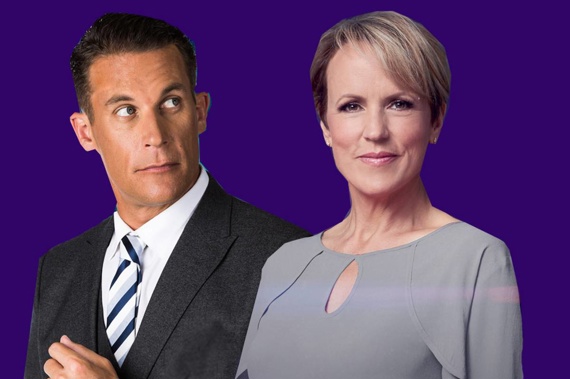
When Jeremy Wells takes his seat next to Hilary Barry at the Seven Sharp desk on Monday it will mean different things to different people.
Many of Seven Sharp's regular audience, for example, will find Wells a youthful new face. Some might recognise him as the man from the Meridian Energy ads, while others may mistake him for former New Zealand cricket captain Daniel Vettori. A few viewers could take weeks or even months to notice that Mike Hosking has even gone at all, and that he's not coming back.
But for younger viewers — let's say those in the 30-45 demographic — this will be a milestone moment. It has long been a generational rite of passage to see the edgy and subversive broadcasters of your youth rise through the ranks to assume positions at the very heart of mainstream media. Future generations will likely come to regard Wells in the same way we now think of the late Sir Paul Holmes or Gary McCormick, completely oblivious to the number of BSA complaints he provoked on shows like Havoc, Eating Media Lunch and The Unauthorised History of New Zealand.
For the generation who grew up on these shows, the future of Seven Sharp and current affairs journalism in New Zealand is suddenly very bright. Having Jeremy "Newsboy" Wells embedded in the primetime current affairs slot opens up a range of exciting possibilities. Here's just a glimpse of what he can bring to the table.
/arc-anglerfish-syd-prod-nzme.s3.amazonaws.com/public/RAW2APSR6ZF2NPOQG4TAPHSSOU.jpg)
Engaging regional content
For years shows like Seven Sharp have been criticised by those south of the Bombay Hills for their "Auckland-centric" focus and lack of attention to the regions. Wells has always had his finger on the pulse of heartland New Zealand, dating all the way back to 1999's Havoc and Newsboy's Sell-Out Tour. His track-record with rural viewers is perhaps best illustrated by that show's infamous "Gay Gore" episode. When Wells returned to the conservative Southland town almost a decade later, he was "accosted by 15 men at a petrol station" who followed him back to his hotel and attempted to beat him up for calling their hometown "greedy old gay man's Gore." That's the kind of audience engagement money just can't buy.
Field interviews
Seven Sharp will be wasting a considerable field reporting talent if it keeps its new host behind the desk. Some of the great New Zealand "man on the street" interviews were conducted by Wells for Eating Media Lunch during its run from 2003 to 2008. The show's report from Destiny Church's "Traditional Family Values" march on Queen St in 2005 is just one example. "What is a family?" Wells asked marchers. "A family is a dad, a mum and a marriage," was the most coherent response. "How do you explain the Topp Twins then?" You'd be hard-pressed to find a journalist who asks a better follow-up question.
Hidden camera stings
Most complaints about the state of New Zealand current affairs television could be easily resolved simply by doing more hidden camera stings. We are a nation that loves to see the misdeeds of dodgy tradies and crooked politicians exposed, and Wells is the perfect person to lead the concealed camera revival having already narrated the most famous one of all. 2003's "Target On Target" parody on Eating Media Lunch was one of the most memorable TV moments of the 00s, and easily the most depraved hidden camera sting ever executed in this country.
Nicknames
In more recent times, as part of the Alternative Commentary Collective, one of Wells' most significant contributions to New Zealand life has been to help coin nicknames for our sporting heroes. Few who witnessed it will forget The Hairy Javelin's six to win in the 2015 Cricket World Cup semifinal at Eden Park, while Steady The Ship has taken on widespread use as the nickname for the side's current captain. While the ACC deals predominantly in cricket and rugby, Seven Sharp has a far broader scope. If TVNZ wants to make the most of its new host's talents, they should let Wells and co-host Hilary Barry bestow nicknames upon all prominent New Zealanders.
- Calum Henderson, NZ Herald
Take your Radio, Podcasts and Music with you









